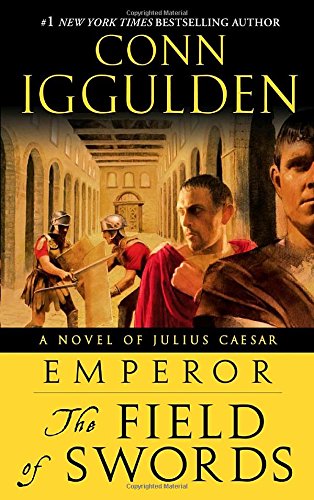
![]() The Field of Swords by Conn Iggulden
The Field of Swords by Conn Iggulden
Conn Iggulden’s The Field of Swords (2005) follows a Caesar who is no longer young. Though he is still eminently capable and still driven to work day and night in pursuit of glory, he is exhausted rather than energized by his work in Spain. Naturally, the real story begins when he returns to Rome to form an alliance with Pompey and Crassus.
Rome considers itself the greatest city in the world, but, to our eyes, it is consumed by corrupt political intrigue in search of power and recognition, its enemies are tortured and slowly executed in public, and its people are entertained by merciless spectacle. Julius is the hero of this text, but he is not given contemporary attitudes. He enjoys the spectacle, the fame, and the glory of Romeo as much as the mob does.
There are many scenes in The Field of Swords that fans of action/adventure and historical fiction will enjoy. There are sequences about the crafting of swords, the sinuous and shifting formations of elite cavalry, and of course there are a few straightforward sword fights. But Iggulden seems to especially enjoy setting up dinners and drinks around large tables where men boast of their military prowess while internally worrying over the way they feel about women — in Caesar’s case, he worries over his attraction for Servilia, a mistress and the mother of his best friend, Marcus Brutus.
The text sometimes can be frustrating. Iggulden has a knack for intrigue and diabolical betrayal, but his depiction of friendship and romance is often less powerful. There is more than one scene when the men in this text find women erotic, perhaps suggesting that Marcus and Julius are very similar, but the relationship between Servilia and Caesar never really made sense to me. Servilia and Julius share an attraction, which would be easy enough to understand, but there is a sort of love between them that readers seem to be expected to accept, perhaps because one historical record describes her as Caesar’s favourite mistress (though in this text, Servilia is Julius’s only partner). As for Brutus and Julius, they are best friends here, nearly brothers. And yet, the trust between them seems so easily compromised. Is this strain well developed, or is it just there to foreshadow betrayal? For whatever reason, it never worked for me in this third installment.
At first glance, the attraction of this story is following famous figures through an adventurous narrative. And yet, what might be more compelling is the fantasy that individuals play a significant role in the grand scheme of things and that perhaps that role was more common in the past than it is today. Though their fastest transportation is a horse and their best weapons are swords, these characters nevertheless build roads and cities. They remove piracy from seas in a couple months. I found it startling to think that there was a time a general might decide to just do such things — and only over the course of a small part of his career. If Rome was great, perhaps it was the ability for individuals to rise to such power that made it so. Interestingly, Julius feels a similar jealousy of the past when he looks upon a crumbling statue of Alexander. The Conqueror did so much while still young; Caesar worries that he has achieved too little in his own time.
If I’d read The Field of Swords 20 years ago as a teenager, it would have been one of the best books I’d read in my life. I would have thought it was going to be one of the best books I’d ever read. Now, it’s hard to rate it higher than “guilty pleasure.” Still, this 2005 novel, like its predecessors in the EMPEROR series, would make for great beach reading.




Wow, I'm really impressed by the 15- and 20-year old owning and running their own bookstores! I loved books as…
There were two interesting articles about publishing that I ran across, the first via a link in the second: No…
My pleasure, Robin! And yes, it surely is some kind of an experience, to be sure....
Thanks for the solution to a mystery many decades old. One of my favourite novels, this. Hilariously funny, completely unpredictable,…
Thank you. I’m all caught up. Back to reading Crimson Embers.